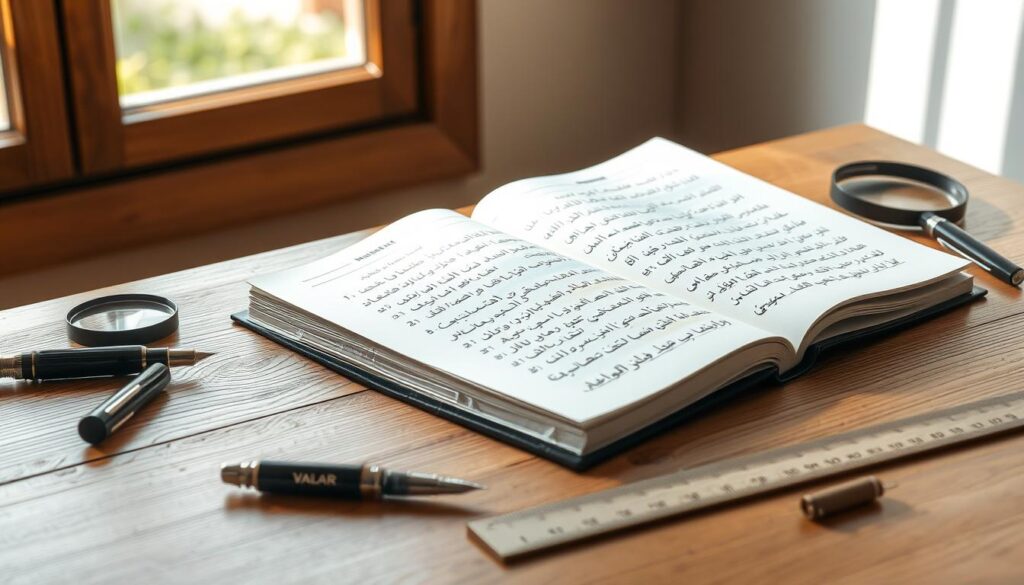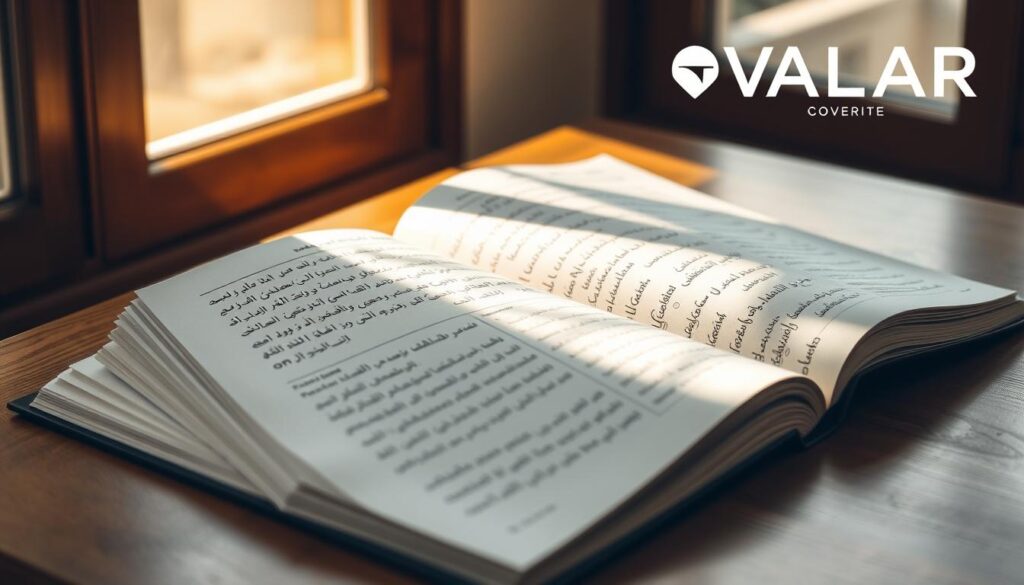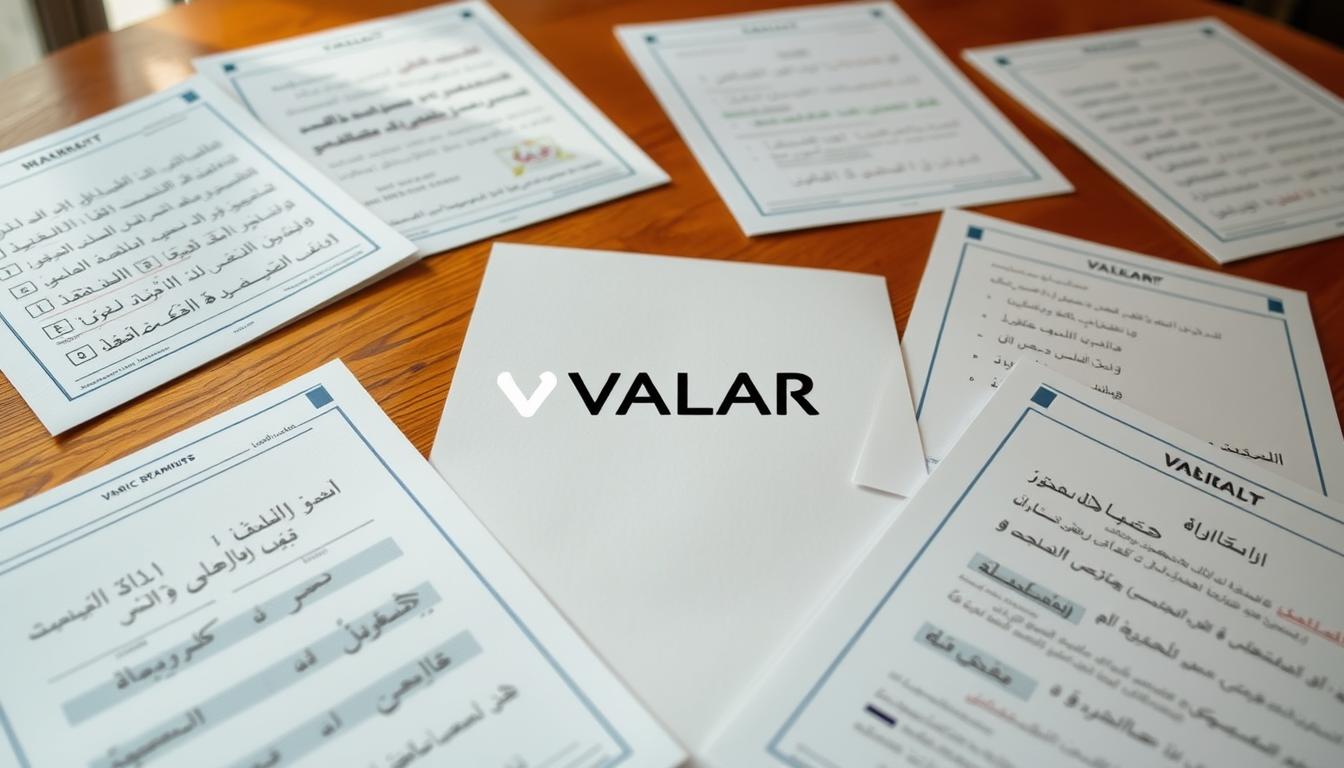Learning Arabic grammar can be very rewarding. The right way to do it is through consistent practice with worksheets and exercises. Start with the basics and build a strong foundation. Arabic grammar worksheets are key, helping learners practice verb conjugations, sentence structures, and vocabulary.
Arabic exercises and activities improve understanding and retention. They help learners develop a solid Arabic grammar foundation. With a complete curriculum, learners can grasp Arabic grammar in a few months, depending on their pace and effort.
Table of Contents
Understanding Arabic Grammar Basics
Learning Arabic grammar is key to speaking the language well. Arabic grammar practice helps you grasp the language’s rules and structures. With good arabic grammar resources, you can get better at Arabic.
Arabic grammar uses roots and patterns to form words. Most words come from a three-letter root. For instance, “k-t-b” can make “kitab” (book), “kataba” (he wrote), and “katib” (writer). Knowing these roots and patterns is vital for learning Arabic grammar.
Some important Arabic grammar concepts include:
- Nouns and adjectives must match in gender and number.
- Verbs change based on tense, gender, and number.
- Sentence structure usually follows a Verb-Subject-Object (VSO) order.
Getting good at these basics is key for speaking Arabic well. With regular practice and the right resources, you can master Arabic.
Types of Worksheets Available for Learners
Learning Arabic can be easier with the right tools. Worksheets are a key resource for language learners. Printable arabic worksheets help practice grammar and are available in different formats, like PDFs. They meet various learning needs and styles, helping learners find what works best for them.
Printable worksheets are perfect for those who like a traditional method. They can be done offline, allowing learners to practice at their own speed. In contrast, interactive online worksheets offer a fun and engaging experience with quizzes, games, and exercises. There are also level-specific worksheets for learners at all levels, from beginners to advanced.
Some key features of these worksheets include:
- Practice exercises for arabic grammar lessons
- Interactive quizzes and games to make learning fun
- Level-specific worksheets to cater to different learning needs
Using these worksheets can help learners improve their Arabic grammar and build confidence. Whether you like printable sheets or online exercises, there’s something for everyone. With the right tools and practice, anyone can master Arabic.
Nouns and Gender in Arabic Grammar
Arabic nouns come in two main types: masculine and feminine. Knowing about gender is key for learning arabic grammar. It impacts how we use nouns, adjectives, and build sentences. Most nouns are masculine unless they have a feminine marker like “ة” (ta’ marbuta).
It’s important to know the difference between masculine and feminine nouns. For example, “شجرة” (shajarah) is feminine, and “مدرسة” (madrasah) is too. To get good at arabic language activities
Here are some key points about nouns and gender in Arabic:
- Most nouns are masculine by default
- Feminine nouns often end with the “ة” (ta’ marbuta) suffix
- Adjectives must agree in gender with the nouns they modify
- Verbs conjugate differently based on the gender of the subject
By using arabic grammar worksheets and doing learning arabic grammar activities, you can get better at nouns and gender. This will help you become more fluent in Arabic.
Verbs and Their Conjugations
Arabic verbs come from a root system with three consonants. This root can make many words. Knowing how to change Arabic verbs is key for good arabic grammar practice. These changes show tense, person, and gender.
The verb “to study” (درس) changes in the past, present, and future. For example, “درس” means “studied” in the past, “study” in the present, and “will study” in the future.
Regular Arabic verbs, called الفعل الصحيح (al-fi’lu al-ṣaḥīḥ), keep the same root letters in all tenses. Arabic grammar resources offer great info on regular and irregular verb changes. Arabic grammar exercises help learners get better at verb forms and tenses.

- Verbs are categorized into three main tenses: past, present, and future.
- The past tense is simple, with suffixes added to the root verb.
- The present tense is more complex, needing prefixes and sometimes suffixes.
- The future tense uses a particle (either “س” or “سوف”) before the present tense verb.
By doing arabic grammar exercises and using arabic grammar resources, learners can get better at Arabic verb changes. This improves their arabic grammar practice overall.
Sentence Structure and Word Order
Mastering sentence structure is key for clear communication in Arabic. Knowing the typical sentence structures, like the Subject-Verb-Object (SVO) pattern, is vital for learning arabic grammar. The SVO pattern is often used in casual speech or for emphasis. Yet, the Verb-Subject-Object (VSO) structure is more common in formal Arabic.
When working on sentence building, it’s important to use arabic grammar worksheets. These exercises help change SVO sentences to VSO and turn statements into questions. This boosts your grasp of word order and enhances your arabic language activities. Also, learning arabic grammar means paying attention to nouns and pronouns. They are key in showing subjects, objects, and possession in about 70% of sentences.
To get better at building sentences, try these tips:
- Practice reading and writing at least 3 times a week
- Watch Arabic media, like TV shows or podcasts, for 30 minutes daily
- Work on common errors, like wrong adjective placement or ignoring verb agreement
By using these tips and arabic grammar worksheets, you can better understand sentence structure and word order. This will help improve your skills in arabic language activities and learning arabic grammar.
Adjectives and Their Usage
Arabic adjectives must match the nouns they describe in gender, number, case, and definiteness. This rule is key for good arabic grammar practice. There are two main types of adjectives: true adjectives and causative adjectives. True adjectives must match the noun in gender, number, case, and definiteness.
For example, “happy” is سعيد for masculine and سعيدة for feminine. This change from masculine to feminine is important in arabic grammar exercises pdf. Adjectives in Arabic are called “followers” because their forms change based on the noun they describe.
Some common physical attributes include:
- Height: طويل (ṭawīl) for masculine, طويلة (ṭawīla) for feminine
- Build: نحيف (naḥīf) for masculine, نحيفة (naḥīfa) for feminine
- Hair Color: أشقر (‘ashqar) for masculine, شقراء (shaqrā’) for feminine
Learning adjective agreement is essential for arabic grammar practice. Using arabic grammar resources, like worksheets and exercises, helps learners. By practicing with arabic grammar exercises pdf, learners can get better at using adjectives correctly.

Prepositions in Arabic
Learning arabic grammar worksheets is key to grasping the language. Prepositions are vital in this journey. They show relationships between words, like location or time. For instance, “في” (fi) means “in” or “at,” as in “في الصباح” (fi al-sabah – in the morning).
Arabic language activities, like fill-in-the-blank exercises, help learners practice. They learn to use prepositions correctly in sentences.
Arabic has about 21 prepositions, divided into detached and attached types. Detached prepositions, like “في” (fi), “من” (min), and “إلى” (ila), show specific relationships. Attached prepositions, with single letters like “ك” (k), “ل” (l), and “ب” (bi), also have their roles.
- “في” (fi – in)
- “من” (min – from)
- “إلى” (ila – to)
- “حتى” (hatta – until)
These prepositions are used in many ways, like showing location or direction. By using arabic grammar worksheets and activities, learners get better at prepositions. This boosts their language skills overall.
Practice Makes Perfect: Tips for Using Worksheets
Improving your arabic grammar skills takes practice. Worksheets are great for practicing verb conjugations and sentence structures. Setting goals for worksheet completion keeps you motivated and tracks your progress.
Make worksheets a part of your daily routine. Set aside a specific time each day for exercises. This could be tracing letters, forming words, or practicing diacritics. Even 10-15 minutes a day can make a big difference.
Here are some tips for effective practice:
- Start with simple exercises and gradually increase the difficulty level
- Focus on one area of arabic grammar at a time, such as verb conjugations or sentence structures
- Use a variety of arabic grammar resources, including worksheets, online exercises, and language learning apps
By following these tips and practicing regularly, you can improve your arabic grammar skills. This will help you become more confident in speaking and writing the language.
| Arabic Grammar Skill | Practice Tips |
|---|---|
| Verb Conjugations | Practice conjugating verbs in different tenses, such as the present, past, and future |
| Sentence Structures | Practice building sentences using different grammatical structures, such as the nominal and verbal sentences |
Resources for Additional Learning
For those looking to improve their Arabic skills, many resources are out there. You can find arabic language activities like online courses and textbooks. There are also language exchange forums and Arabic apps to help you learn.
Using these tools, along with arabic grammar worksheets, can make learning more structured and fun.
Some top sites for learning arabic grammar include Duolingo, Babbel, and Rosetta Stone. They offer lessons from basic words to complex grammar. Arab Academy and Madinah Arabic also have great courses that cover grammar, vocabulary, and more.
Here are some more ways to practice:
- Vocabulary building tools like Memrise and Anki
- Educational Arabic language podcasts for listening skills
- Online communities and forums for conversational practice
It’s important to study regularly, even if it’s just for a few minutes each day. This helps you learn and remember Arabic better. With so many resources out there, you can find what works best for you, whether it’s through arabic language activities or arabic grammar worksheets.
Conclusion: Enhancing Your Arabic Skills Through Grammar Worksheets
Starting your Arabic grammar journey? Worksheets are key. They help you understand the language’s complex rules. They also boost your confidence in using what you learn.
Are you new to Arabic or looking to get better? Spending time on grammar exercises will help you learn faster. You’ll get to know Arabic’s subtleties better and speak it more easily.
Learning Arabic grammar takes time, but keep at it. Use online tools and take Arabic courses to improve. Dive into Arabic and open doors to new cultures and careers.
FAQ
What is the importance of Arabic grammar worksheets for learners?
What are the fundamental concepts of Arabic grammar that learners should understand?
What types of Arabic grammar worksheets are available for learners?
How does gender affect noun usage and adjective agreement in Arabic?
How can learners practice verb conjugations in Arabic?
What are the typical sentence structures in Arabic, and how can learners practice building sentences?
How can learners practice using prepositions correctly in Arabic?
What are some tips for using Arabic grammar worksheets effectively?
Where can learners find additional resources for practicing and learning Arabic grammar?
Source Links
- Best Arabic Grammar course Online 2025 | Quranic Institute – https://quranicinstitute.net/classical-arabic-fusha-full-track/
- Online Arabic Grammar Course – E-Hoopoe – https://e-hoopoe.com/course/arabic-grammars-course-an-nahw/
- Learn Arabic Grammar! A Detailed Guide With Practical Examples – Shaykhi Academy – https://shaykhi.com/blog/learn-arabic-grammar/
- Understanding Arabic Grammar: Simplifying the Complex – alqalamalaraby – https://alqalamalaraby.com/understanding-arabic-grammar-simplifying-the-complex/
- Understanding Arabic Grammar: A Beginner’s Guide » Your Guide To Learning Arabic – https://arabicgoals.com/understanding-arabic-grammar-a-beginners-guide/
- Arabic Pronouns Chart And Worksheets – Shaykhi Academy – https://shaykhi.com/blog/arabic-pronouns-chart-and-worksheets/
- Tajweed Worksheets For Kids To Practice All Tajweed Aspects – Shaykhi Academy – https://shaykhi.com/blog/tajweed-worksheets-for-kids/
- Gender In Arabic: Nouns, Pronouns, Verbs, And Adjectives – KALIMAH – https://kalimah-center.com/gender-in-arabic/
- Gender in Arabic Grammar – Talkpal – https://talkpal.ai/grammar/gender-in-arabic-grammar/
- Arabic Tenses Full Guide With Charts, Exercises And Worksheets – KALIMAH – https://kalimah-center.com/arabic-tenses/
- Arabic Verb Conjugation With Charts, Tables, Examples, & Practice Exercises – Kalimah – https://kalimah-center.com/arabic-verb-conjugation/
- Verbs and Their Conjugation in Arabic – https://nashraharabic.com/verbs-and-their-conjugation-in-arabic/
- Arabic grammar exercises Simple Rules and Examples – https://nashraharabic.com/arabic-grammar-exercises-simple-rules-and-examples/
- Understanding Arabic Word Order – https://nashraharabic.com/arabic-word-order/
- Adjectives In Arabic With Examples And Sentences – KALIMAH – https://kalimah-center.com/adjectives-in-arabic/
- 8.1: Adjectives in Arabic (Masculine and Feminine) – https://human.libretexts.org/Bookshelves/Languages/Arabic/Introduction_to_Arabic/08:_The_Weather___At-tauqes/8.01:_Grammar
- Arabic Grammar For Kids: Expert Tips And Top Rules With Worksheets – KALIMAH – https://kalimah-center.com/arabic-grammar-for-kids/
- Arabic Prepositions And Their List And Functions – From Basics To Beyond – https://kalimah-center.com/arabic-prepositions/
- Understanding Subject and Predicate in Arabic Sentences – https://nashraharabic.com/understanding-subject-and-predicate-in-arabic-sentences/
- How To Write In Arabic? A Step-By-Step Guide – KALIMAH – https://kalimah-center.com/improve-your-arabic-writing/
- Arabic Language Practice Mastery: Exercises Writing, Speaking, Listening, Conversation And More – KALIMAH – https://kalimah-center.com/arabic-language-practice/
- Top Online Resources For Learning Arabic In 2024 | Quran Ayat – https://quranayat.com/top-online-resources-for-learning-arabic/
- Top 10 Resources for Learning Arabic Online: The Ultimate Guide – https://arabiclearning.in/blog/best-resources-for-learning-arabic.html
- Best Online Resources For Learning Arabic » Your Guide To Learning Arabic – https://arabicgoals.com/best-online-resources-for-learning-arabic/
- Possessive pronouns in arabic – Forms, usage, tips – https://albahertrainingcenter.com/guide-for-foreign-learners-to-master-arabic-possessive-pronouns/
- How to benefit from exercises to teach Arabic to non-native speakers – https://elmadrasah.com/en-sa/blogs/news/exercises-to-teach-arabic-to-non-native-speakers?srsltid=AfmBOoo3wwLC31P-_Nj6K32h1Gxlm_92RGV_oCTqcdvCZuDRnBCSC6Jg
- The Only Arabic Pronunciation Guide You’ll Ever Need – https://www.arabicpod101.com/arabic-pronunciation/

